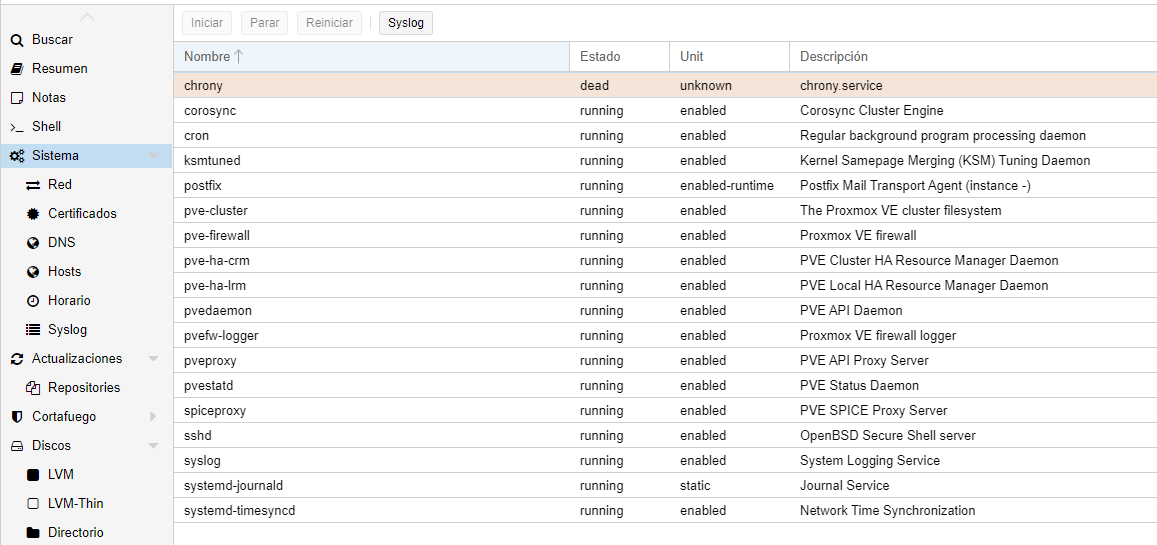[SOLVED] Error: chrony = Dead
- Thread starter corianito
- Start date
You are using an out of date browser. It may not display this or other websites correctly.
You should upgrade or use an alternative browser.
You should upgrade or use an alternative browser.
Hi.
It's ok in your case as systemd-timesyncd runs (chrony is another NTP daemon).
We plan to improve the optics on that one to better convey that.
It's ok in your case as systemd-timesyncd runs (chrony is another NTP daemon).
We plan to improve the optics on that one to better convey that.
Hi.
It's ok in your case as systemd-timesyncd runs (chrony is another NTP daemon).
We plan to improve the optics on that one to better convey that.
Is chrony the future - stepping away from ntpd , and if yes how can one migrate from ntpd to chrony while performing an upgrade of PVE ?
We rather switched to chrony as default for new installations due to some limitations of
The ntpd or openntpd NTP daemons are working just fine in general, and if you have them setup there's no general reason for a need to switch over to chrony, especially if they're working out for you.
systemd-timesync that may not be ideal in a hyper-visor/clustered environment as it's rather designed with a desktop use case in mind.The ntpd or openntpd NTP daemons are working just fine in general, and if you have them setup there's no general reason for a need to switch over to chrony, especially if they're working out for you.
HelloWe rather switched to chrony as default for new installations due to some limitations ofsystemd-timesyncthat may not be ideal in a hyper-visor/clustered environment as it's rather designed with a desktop use case in mind.
The ntpd or openntpd NTP daemons are working just fine in general, and if you have them setup there's no general reason for a need to switch over to chrony, especially if they're working out for you.
I want to use proxmox's Chrony service to act as an NTP server for my domain.
is it feasible and logical?
I want to use proxmox's Chrony service to act as an NTP server for my domain.
is it feasible and logical?
It's feasible, you mainly need to configure the IP ranges that are allowed to access the chrony daemon on a PVE as NTP server:
https://chrony.tuxfamily.org/faq.html#_how_do_i_make_an_ntp_server
For more details checkout the
chrony.conf manual page, it even has its own section dedicated to server usage:https://manpages.debian.org/bullseye/chrony/chrony.conf.5.en.html#NTP_server
Regarding the "ist it logical?" question: That depends on your setup, use case(s) and reason to do so.
In general, there are almost no scenarios when a local NTP server could hurt one, at least as long as you can guarantee its uptime, and if one runs a lot of hosts it's definitively nicer to do so, as it avoids load on the public NTP server pools.
A benefit can be that your local view of time most often will be more accurate, as LAN latencies are low and often also more stable compared to packet latencies over wan (internet). Note here that the level of accuracy gained is probably still relatively small, so if you do not run special software that requires highly synchronized (local) time stamps it may not show.
But, if you actually fare better for time accuracy compared to the internet/global synchronized views depends on the time source the local chrony NTP server uses, if that's a good time-server (like most of ntp.org's server pools are) then you'll not do better, albeit also not significantly worse. If you run your own local stratum 0 clock (most realistically through a GPS/GALILEO/... receiver, less realistically because you happen to have a scientific grade atomic clock lying around) you may get better results there too, but as mentioned relatively speaking the gained accuracy may not be that big, and for most commodity software the accuracy from the NTP pool is really good enough.
It's feasible, you mainly need to configure the IP ranges that are allowed to access the chrony daemon on a PVE as NTP server:
https://chrony.tuxfamily.org/faq.html#_how_do_i_make_an_ntp_server
For more details checkout thechrony.confmanual page, it even has its own section dedicated to server usage:
https://manpages.debian.org/bullseye/chrony/chrony.conf.5.en.html#NTP_server
Regarding the "ist it logical?" question: That depends on your setup, use case(s) and reason to do so.
In general, there are almost no scenarios when a local NTP server could hurt one, at least as long as you can guarantee its uptime, and if one runs a lot of hosts it's definitively nicer to do so, as it avoids load on the public NTP server pools.
A benefit can be that your local view of time most often will be more accurate, as LAN latencies are low and often also more stable compared to packet latencies over wan (internet). Note here that the level of accuracy gained is probably still relatively small, so if you do not run special software that requires highly synchronized (local) time stamps it may not show.
But, if you actually fare better for time accuracy compared to the internet/global synchronized views depends on the time source the local chrony NTP server uses, if that's a good time-server (like most of ntp.org's server pools are) then you'll not do better, albeit also not significantly worse. If you run your own local stratum 0 clock (most realistically through a GPS/GALILEO/... receiver, less realistically because you happen to have a scientific grade atomic clock lying around) you may get better results there too, but as mentioned relatively speaking the gained accuracy may not be that big, and for most commodity software the accuracy from the NTP pool is really good enough.
Hi
Thank you for the feedback. I had forgotten to specify that it is a cluster of 9 servers. in this case should I activate the chrony service on the 9 servers? will there be an impact on the internal synchronization of the cluster?


